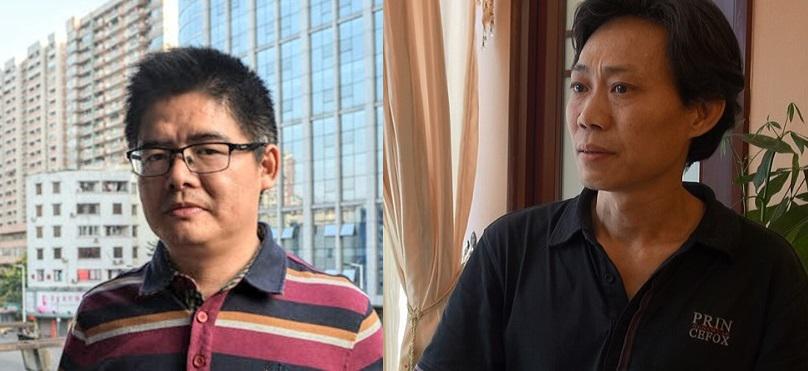Two leading labour activists have been detained without trial for nine months following a massive crackdown on civil society labour groups in Guangzhou in early December last year.
The director of the Panyu Workers Service Centre, Zeng Feiyang, has been held since 3 December in a Guangzhou detention centre with severely restricted access to his lawyers. During that time, the authorities attempted to smear Zeng’s name in the national media and harassed his elderly mother when she sought to sue those media organizations for defamation.
Panyu staff member, Meng Han, has also been detained for nine months. He has refused to cooperate with the investigation into Zeng Feiyang and, as a result, his parents have also been subject to intimidation. They were forced to move homes this summer after thugs attacked their apartment door with an axe.

Zeng Feiyang (left) and Meng Han (right)
Panyu staff member, Zhu Xiaomei, was released on bail after two months in detention. Zhu was a nursing mother at the time of her arrest and the separation caused immense distress for both mother and child. All three Panyu activists are charged with “gathering a crowd to disrupt social order” but have yet to be formally tried.
Another labour activist, He Xiaobo, the head of the Foshan-based labour rights group Nanfeiyan, was released on bail in early April after being charged with “misappropriation of funds.”
Several other activists were released soon after questioning in December or early January but have not been allowed to continue with their work.
China Labour Bulletin worked with the Panyu Centre for five years before the December 2015 crackdown: Every aspect of that cooperation was known by the security authorities in Guangdong from its very outset.
During those five years, the Panyu Centre emerged as a pioneer and a leader in enterprise collective bargaining in China. Staff helped workers to elect bargaining representatives and devise effective strategies that could bring obstinate employers to the bargaining table. The centre helped workers obtain nearly 200 million yuan in wages, lay-off compensation, social insurance contributions and other benefits.
CLB and the civil society labour groups that we work with in mainland China have essentially done the job of China’s official trade union, the All-China Federation of Trade Unions (ACFTU). If China is to improve labour relations and enhance social stability, it is essential that these civil society organizations be allowed to flourish.
If the government refuses to sanction civil society participation however, then it must ensure that the ACFTU starts to act like a real trade union, learns from and builds on the important work China’s civil society labour groups have already accomplished.
